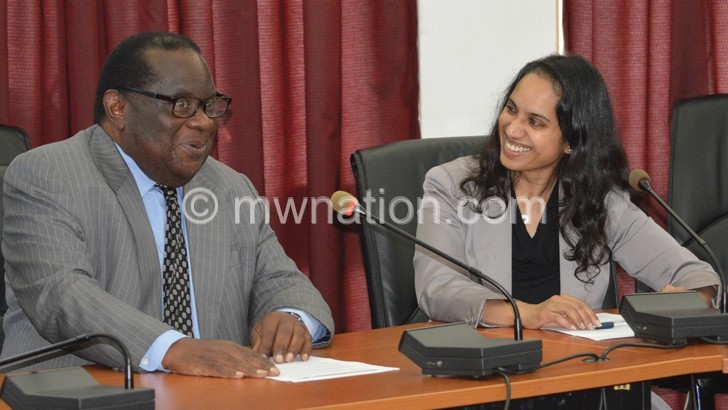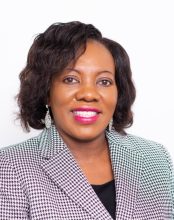Goodall wields K30 billion knife
Finance, Economic Planning and Development Minister Goodall Gondwe said yesterday he is set to cut K30 billion from the K1.3 trillion 2017/18 National Budget amid falling revenue.
That chop is around 2.3 percent of the total budget and—while not as steep—goes to show pragmatism on the back of shrinking domestic revenue collection and a retreating donor community.
The slashes are expected across a majority of government ministries, departments and agencies (MDAs) in areas considered non-essential such as travel, which a Treasury document last week said could be reduced by as much as 10 percent.

Gondwe was speaking during a press briefing at the end of ‘Article IV Consultations’—a surveillance exercise in which an International Monetary Fund (IMF) team of economists visits a country to assess economic and financial developments and discuss policy direction with government. The team was in the country for two weeks.
After the consultations, the IMF mission forwards its findings to the fund’s Executive Board for decisions, including eligibility for a new economic programme.
For Malawi, the fund’s executive board will meet in April this year on whether Lilongwe deserves a new programme, most likely in the mode of Extended Credit Facility (ECF).
Among likely conditions for a new programme—which comes with a concessionary loan package—is a commitment by government to reign in expenditure, which is easier said than done as the country gallops towards general elections next year.
But Gondwe insisted that the K30 billion cut will be achieved through prioritisation of projects and travel-relate budget cuts across the public sector.
He said he would slash the K30 billion from the recurrent budget of about K600 billion.
A 20 percent cut to fuel allowances and a drop in the number of officials enjoying vehicle benefits, among other measures, should do the trick, according to Gondwe.
“We might reduce expenditure up to a point where we can absorb the shortfall from the revenue and bailout to Admarc,” he said.
Speaking at the end of the mission yesterday, IMF’s Malawi mission chief Pritha Mitra said in an interview that the country’s chances of qualifying for the next ECF were good, but said Lilongwe needed to tough measures ahead of the board’s discussion.
These measures, Mitra said; include actions to foster revenues for government and spending carefully while focusing on priority areas in social and infrastructure development.
“If the government spends wisely, this will help improve the productive capacity of the economy and reduce inflationary pressures, allowing for less domestic borrowing and allow the private sector to borrow more from the banking system,” she said.
Mitra also said the IMF team had discussed with government ways of improving tax administration so that the government is able to collect more in the face of poor domestic revenue.
Gondwe is grappling with a K38 billion domestic revenue shortfall owing to MRA’s underperformance in revenue collection.
The budget is also under pressure to fill the K45 billion holes created when Capital Hill bailed out the debt-ridden and scandalised Agricultural Development and Marketing Corporation.
The IMF is also worried about the rising budget deficit and has since called for a narrowing of the fiscal gap.
“The authorities will deploy strong remedial measures to address the widening of the budget deficit in the current financial year and shift to a slightly positive primary balance in the next fiscal year,” the press release on the preliminary findings of the mission reads.
According to Gondwe, the deficit is projected at K183 billion against the earlier forecast of K195 billion. He vowed to tighten belts.
Outlining the measures to reduce the budget deficit, Gondwe said government has revised the development budget pegged at K346 billion and only prioritise about 25 projects that will be completed by June this year, including those wholly funded by donors.
But while expenditure controls are crucial to achieving fiscal sustainability, increasing revenue is equally key to the country’s long term financial health—and that is a challenge that goes beyond MRA’s efficiency or lack thereof.
As one tax expert Emmanuel Kaluluma observed yesterday that while MRA should account for its failure to meet its target on tax collection, the weak economy—depressed by an energy crisis—was also to blame.
“It is a known fact that power drives the economy. During the first half of the 2017/18 financial year, businesses were disturbed by power failure. As a result, their performance even affected tax returns.
“But again, MRA has not expanded its tax net wider,” he said.
MRA has attributed the poor performance to a weak performance in Pay as You Earn (Paye), Fringe Benefits (FBT), corporate tax, withholding tax, excise and duty, and import taxes-Value Added Tax (VAT).
But in a sign that recovery could be underway, the IMF, in its press release, forecasts an economic growth rate of six to seven percent over the medium-term buoyed by enhanced infrastructure investment and social services as well as an improved business environment. n





